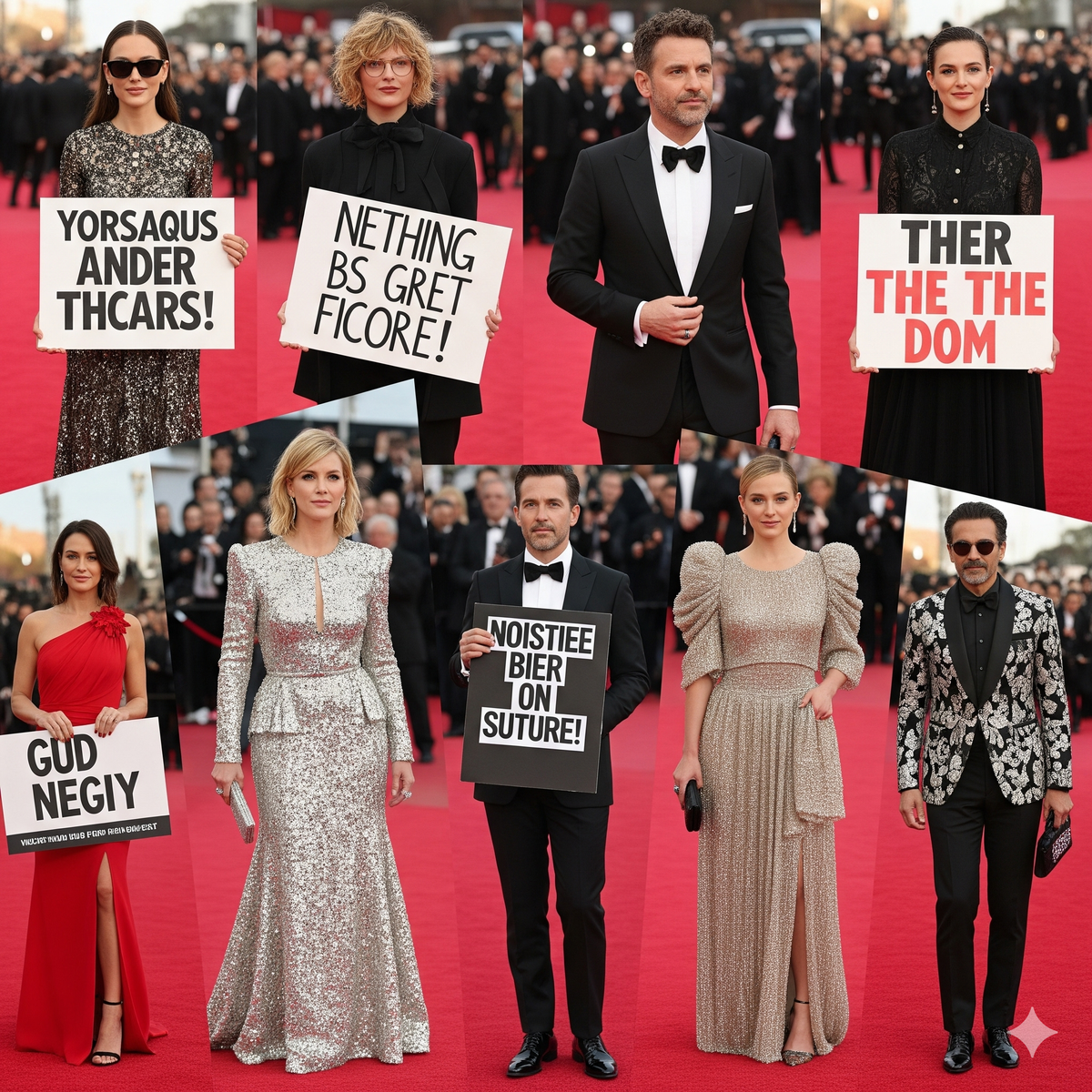Red Carpet Politics: Are Award Shows Now More About Activism Than Art?
Award shows are no longer just about trophies and gowns. Today’s red carpets double as political stages, where activism, identity, and cultural battles often overshadow the celebration of artistry.

For decades, award shows were about pure glamour stunning gowns, golden trophies, and the thrill of seeing whether our favorite stars walked home with a win. But in recent years, something has shifted. Red carpets and stages that were once reserved for celebrating artistic excellence have transformed into platforms for political statements, social justice advocacy, and cultural reckonings. The glitter is still there, but it’s now layered with causes, hashtags, and movements.
This raises a pressing question: Are award shows still about honoring art or have they become more about activism than artistry?
The Evolution of Award Shows: From Glamour to Statements
Once upon a time, the Oscars, Grammys, and Golden Globes were relatively straightforward affairs. A host cracked jokes, stars walked away with trophies, and the biggest controversies involved snubs or awkward speeches. But as global media expanded and social platforms amplified every moment, award shows became more than entertainment they became political stages.
Moments like Marlon Brando sending Sacheen Littlefeather to decline his Oscar in 1973 or Vanessa Redgrave’s fiery speech on Zionism in 1978 were once considered shocking anomalies. Today, they feel almost tame compared to the bold, choreographed statements we see now.

From black gowns at the Golden Globes in support of the #MeToo movement to stars using acceptance speeches to call out political leaders, these platforms have evolved into cultural battlefields. In 2025, you’re as likely to walk away from an award show remembering a climate change plea or a human rights chant as you are a Best Picture winner.
Why the Shift Happened
So what caused the transformation? Several forces converged:
1. The Social Media Megaphone
Twitter, TikTok, and Instagram turned award shows into real-time global conversations. A 30-second speech clip can go viral worldwide, inspiring hashtags and activism that lives far longer than the ceremony itself. Stars know their influence reaches beyond the theater walls and they act accordingly.
2. Hollywood’s Reckoning
Movements like #MeToo, Time’s Up, and Black Lives Matter forced the industry to confront its own systemic problems. Silence became complicity. For celebrities, using award show stages for activism wasn’t just optional; it became expected.
3. Audiences Want Values, Not Just Voices
Younger viewers, particularly Gen Z, are more politically engaged and socially conscious. They expect public figures to “stand for something.” A glamorous gown without a statement to match can feel hollow to this demographic.
4. Declining Ratings and the Spectacle of Controversy
As award show viewership declined, networks and producers leaned into the viral potential of politically charged moments. Whether viewers agree or disagree, they tune in for the drama.
The Rise of Red Carpet Activism
The red carpet, once a stage for “Who are you wearing?”, is now a billboard for activism. Designers and stars collaborate on outfits that double as political messages.
- Black gowns in solidarity with sexual harassment survivors.
- Climate-conscious couture made of recycled plastics or lab-grown fabrics.
- Pinned ribbons for causes ranging from AIDS awareness to refugee support.
- Slogans stitched directly into gowns: “Time’s Up,” “Equal Pay Now,” or “No War.”
Every detail is photographed, dissected, and shared online, creating a ripple effect that transcends the event. The red carpet has become a runway of resistance.
Acceptance Speeches as Political Manifestos
It’s no longer unusual for an acceptance speech to sound like a campaign rally. Stars seize the microphone to talk about climate change, reproductive rights, racial justice, LGBTQ+ protections, or international conflicts.
While some speeches are heartfelt and personal, others feel carefully scripted for maximum impact. In fact, many celebrities now work with political consultants or PR strategists to craft their award-night words.

The line between actor and activist is blurrier than ever.
The Double-Edged Sword of Award Show Activism
This shift is not without controversy. For some, award show activism is inspiring—a sign that artists are using their platforms responsibly. For others, it feels performative, self-serving, or even hypocritical.
The Upside
- Raising Awareness: Causes gain visibility on a massive stage, reaching millions who may not otherwise engage.
- Normalizing Activism: Stars can shift cultural conversations, making difficult topics part of mainstream dialogue.
- Holding Power to Account: Award shows can act as megaphones for marginalized voices or issues ignored by politicians.
The Backlash
- Virtue Signaling: Critics argue some stars adopt causes more for clout than conviction. Wearing a ribbon is easy; real activism requires sacrifice.
- Hypocrisy: Celebrities often face accusations of double standards—flying private jets while preaching climate action, for example.
- Audience Alienation: Many viewers tune in for escapism, not politics. For them, activist speeches feel like moral lectures.
- Art Overshadowed: The very purpose of the ceremony—celebrating artistic excellence sometimes gets lost in the noise.
Are Award Shows Becoming Less About the Awards?
Let’s face it: in recent years, most people can name at least one viral activist moment from an award show but struggle to recall who actually won.
Think about it who remembers the Best Actress winner from a given year versus the fiery speech about inequality, the wardrobe protest, or the celebrity walkout?
The spectacle of politics has, in many ways, overtaken the celebration of craft. While the trophies still matter to those inside the industry, the public narrative often centers on activism.
The Role of Brands and Sponsors
Another overlooked dimension: brands and sponsors love activism when it’s profitable.
Award shows are lucrative advertising spaces. When stars embrace trendy causes, brands piggyback on the moment, releasing “activist” campaigns, running commercials tied to social justice, or aligning with stars whose values attract younger audiences.
This creates a feedback loop where activism isn’t just organic it’s commodified. The question becomes: Is this authentic advocacy, or just another marketing strategy?
Globalization of Award Show Activism
Award show activism isn’t just a Hollywood phenomenon. From Bollywood’s International Indian Film Academy Awards to Europe’s Cannes Film Festival, activism now plays out globally.
- Bollywood stars bring attention to farmer protests and gender equality.
- Cannes has been a hub for climate activism and Palestine solidarity.
- Korean stars use platforms like the Mnet Asian Music Awards to highlight mental health awareness.
The red carpet has become a global political stage, crossing borders and amplifying global causes.

The Generational Divide
Not everyone views this trend the same way.
- Gen Z and Millennials often embrace activist award shows, seeing them as authentic extensions of art’s role in society.
- Older audiences, particularly those seeking pure entertainment, sometimes view it as unnecessary politicization of escapist events.
This generational tension explains why award shows are both celebrated for their boldness and criticized for their “preachiness.”
The Future of Award Shows: Activism as the New Norm
Looking ahead, it seems unlikely that award shows will return to their purely artistic roots. Activism has become baked into their DNA.
But the real test will be authenticity. As audiences grow more skeptical of performative activism, stars and producers will need to ensure that red carpet politics are backed by real-world actions.
We may also see activism evolve:
- Virtual stages amplifying digital movements.
- Hybrid award shows blending traditional ceremonies with activist-driven storytelling.
- Global coalitions of artists uniting across industries for shared causes.
Award shows may become less about competition and more about collective cultural declarations.
So… Activism or Art?
In truth, it’s no longer an either-or question. Art and activism have become intertwined. The same industry that once asked audiences to “suspend disbelief” now asks them to confront uncomfortable realities while still offering entertainment.
Perhaps the better question is: Shouldn’t art always be political?
From Shakespeare critiquing monarchy to Bob Dylan singing about civil rights, art has long been a vehicle for social change. Award shows, in this sense, are just the latest frontier in the marriage of culture and politics.
The difference today is scale. Social media amplifies every moment, and celebrity culture ensures that activism travels further and faster than before.
Final Thoughts
Award shows are no longer just about golden statues or glamorous gowns. They’ve become battlegrounds for values, identity, and global causes.
For some, that makes them more meaningful than ever. For others, it diminishes the artistry they were meant to celebrate.
What’s clear is that the red carpet is now more than a runway it’s a political stage. And in a world where entertainment, politics, and identity are increasingly intertwined, maybe award shows are simply reflecting the times we live in.
Whether you tune in for the art, the activism, or the spectacle, one thing’s certain: the red carpet will never just be about fashion again.




